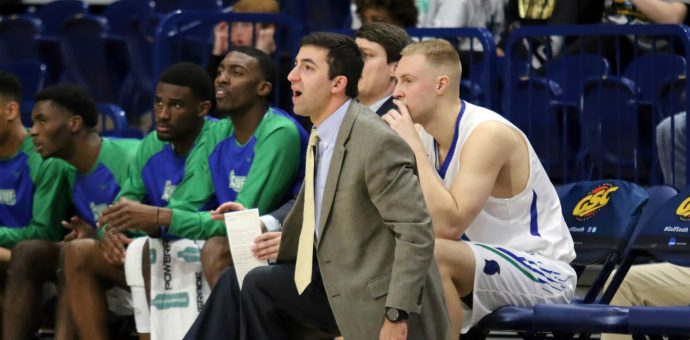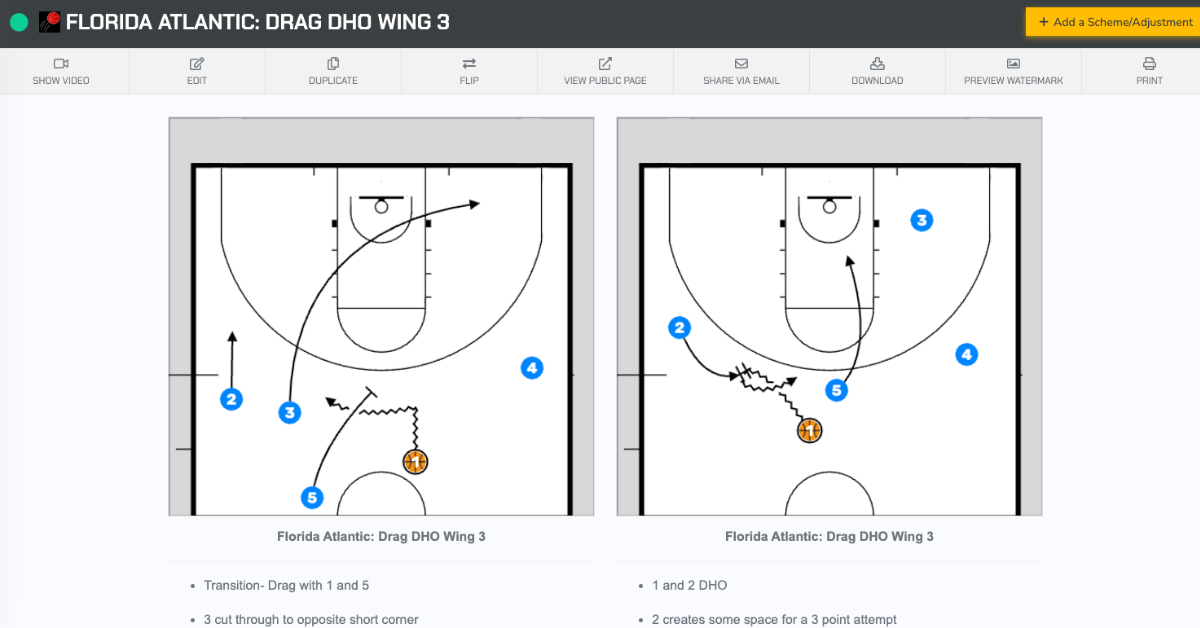This article was written by University of West Florida Assistant Men’s Coach Brian Benator.
With the start of college basketball season upon us, each member of a coaching staff is charged with many responsibilities. Whether you are in charge of recruiting, academics, or team travel, more than likely you have some type of responsibility during the game. Throughout my coaching career, my in-game role as an assistant coach has varied depending on what my head coach needs from me.
During the different stops along the journey, I have learned a number of different things that have helped me develop as an assistant coach while also preparing me for the opportunity one day to lead my own program. Here are some of the key concepts and ideas that I have learned along the way.
Know Your Opponent
Most programs split up scouting responsibilities during the course of a 28-31 game schedule, however, sometimes the head coach may organize scouting to where there are only one or maybe two coaches responsible for scouting an entire season. One of the most important lessons I learned in scouting comes from my former head coach at Young Harris College, Pete Herrmann.
Coach Herrmann told me prior to our first exhibition game “to make sure and give the players no excuse.” Coach Herrmann meant to make sure you knew everything about our opponents backward and forwards so that you could prepare the players for any scenario throughout the game.
It is so important for a coach who has the scout to know as many details of the team’s schemes and individual tendencies of each player as possible. No detail is too small. How many ways do they defend side ball screens? What is their go-to play late in the shot clock? What does their starting four-man like to do on the left block?
We’ll even go as far as knowing what hand the player who tries to control the opening tip uses and where he will try to tip it. What do you need to know about an opponent? The list is endless. At the same time, it is vital to make sure that your players are prepared without frying their brains.
Depending on your head coach, you have to prioritize what information you give to the players during game preparation. However, you as the one in charge of the scout need to know as much as you can and prepare for any and everything.
What if the game is not your scout? Will you sit and watch and be a cheerleader, or will you find a way to help your team? I have always taken the approach that even if the game is not my scout, I will watch one or two games to get an idea of how our opponent wants to play. While I may not have the details that the coach in charge of the scout does, I want to make sure I know tendencies and schemes and can contribute to our team’s success.
If I have an idea of what our opponent is trying to do, I may be able to offer a suggestion or pick up on something that can help us win a possession. We always tell our team about the importance of one possession. This is not any different. If I can help our team steal a possession by watching one or two games when it is not my scout, then I’ve contributed to our success.
Whatever You Are Charting – DO IT WELL
Every head coach values certain stats that he uses as a measuring stick for success. Those stats can vary from game to game. One night your head coach may want to have deflections and missed block outs charted. Another night, he may want to chart each possession both offensively and defensively to find the outcome.
Whatever your head coach is asking you to chart, do it and do it well. Do not take any shortcuts. There is a reason the head coach wants to see what he is asking you to chart. It does not matter if you are playing an exhibition game or if it is your league championship game. Make sure that you do not miss any part of what you are supposed to chart.
Make sure your chart is organized to where you and your head coach can understand the notes. There are times during a game where there is a quick back-and-forth action or adrenaline rush when you go on a big scoring run. During those moments, you have to remain focused and not get too caught up in the moment and forget to chart. I’ll go back to what I said earlier about details. There is no detail too small.
Get To Know Officials
Even though the head coach is primarily the one speaking with officials, I think it’s important to at least have an idea of who is calling your game. When I was a young coach, one of my responsibilities was finding out who our referees were for the game and reporting them back to my head coach. I would find out from our Sports Information Director who was assigned to our game, then introduce myself to them prior to tip-off.
Ever since then, I have always made it a point to at least introduce myself to our referees in the pre-game. As my career has progressed, I have become more comfortable conversing with referees during the pre-game warm-up and also during the game. While I always defer to my head coach with regard to speaking with referees during the game, I feel it is important to have a rapport with them so you can communicate effectively during the game if need be.
From a big picture standpoint, you never know when you might run into an official down the road in your career. Like the coaching industry, officials are trying to move up in level just like we are. You may have a young official on your game when you are at a lower level of basketball, and 15 years later, you may be the head coach of a division one school and he may have moved up as well.
He might be on your championship game with an NCAA Tournament berth on the line. I can promise you, he will remember how you interacted back when and the respect that you showed him. We always tell our players that you get one chance to make a first impression. Make sure you’re making the right impression.
Bring Energy and Stay Composed
Basketball games offer a constant wave of ups and downs. You may start the game 4 of 5 from 3-point range and be up 12-2. It’s a big game. It’s loud in the arena. Your team is jacked up. Your adrenaline is pumping. You’re pumping your fists in the air and jumping up and down. You can taste the win. Relax. There’s 16:45 left in the first half. Play resumes.
All of the sudden your team goes cold. You are 0 for your last 7 and have 4 turnovers. They go on a 15-2 run. You’re down 14-17 at the under eight-minute media timeout. You can hear a pin drop in the arena. Your team is walking to the bench sulking. The head coach is frustrated. You are discouraged. Relax. It’s a one-possession game and there is a lot of basketball left to be played.
Why did I just paint that picture? As a coach, I am a big believer that you have to bring a lot of energy, yet at the same time, you need to stay composed. We talk to our team about basketball being a game of runs. Whether you’re on the good part or bad part of those runs, your team has to see that you are composed.
I would be willing to bet if a team is walking back to the huddle and sees their coaches showing disappointment, the likelihood of them regaining focus is questionable. But if they walk back and see that you are showing positive body language and offering words of encouragement with high energy, I would bet they will regain their focus on doing what is necessary to achieve success.
Offer Solutions
Throughout the course of a game, there are so many variables that can impact what’s going on. Some can be positive, but conversely, some can be negative. When things are going well for your team, it’s often easy to say “if it’s not broken, there’s no reason to fix it.” However, it’s important to be thinking ahead in the event that your opponent figures out how to stop whatever it is that’s going well.
Make sure you have some ideas that you can present to your head coach if he hasn’t already thought of them. On the opposite end of the spectrum, if things aren’t going well, do not be the assistant that walks to the coaches’ meeting during a timeout and complains that things aren’t going well.
If something is not going how it is supposed to, be ready to offer a suggestion that will counteract the bad and turn it into something good. Don’t rehash problems to your head coach. Offer solutions that help your team win.
Think Like a Head Coach
My career aspirations are to be a head coach at the highest level of college basketball. Ever since I entered the business, I have always tried to think like a head coach. More importantly, I have tried to think like the head coach that I am working for during that season. So many times when trying to move up from an assistant to a head coach, the question an athletic director asks is “Is he ready to move six inches over and be the decision maker instead of the one who is suggesting the decisions?”
There will be times during the game that I think about what I would have done in a certain situation if I was the head coach. After the game sometimes I’ll ask my head coach if he would have done the same during that moment. Whether he tells me I would have been right, wrong, or indifferent, I want to take every opportunity to continually learn the game so I can be ready to help our team the next time that we are presented with a similar situation.
Conclusion
I hope this article can help in even the smallest of ways. Some of these things you may already do, and some you may add to your toolbox as a coach. At any rate, coaching is a lifelong learning profession. You can always improve your skill sets as a coach and leader of young men. We tell our players all the time that if you get one percent better each day, then those deposits will add up and have the opportunity to become something very special.
The same can be said for coaching. If we get one percent better in our craft each day, we cannot only better ourselves individually, but we can help our teams be that much better. Good luck to everyone in the business this coming season. Our practice and games at the University of West Florida are open to any and every one. Please feel free to shoot me an email at [email protected], or you can call our basketball office at (850) 474-3320 if we can be of help in any way.








